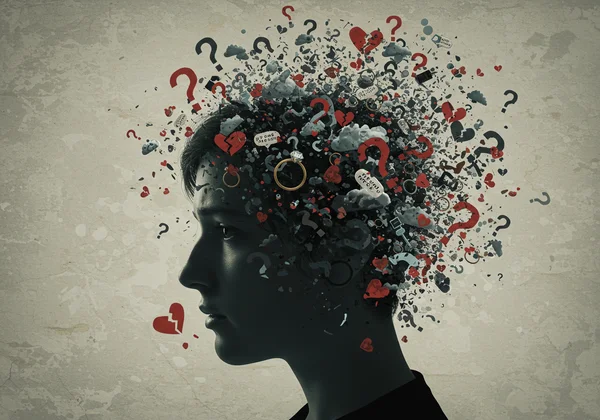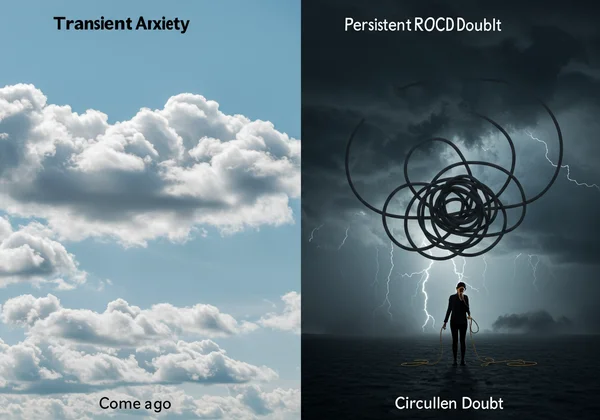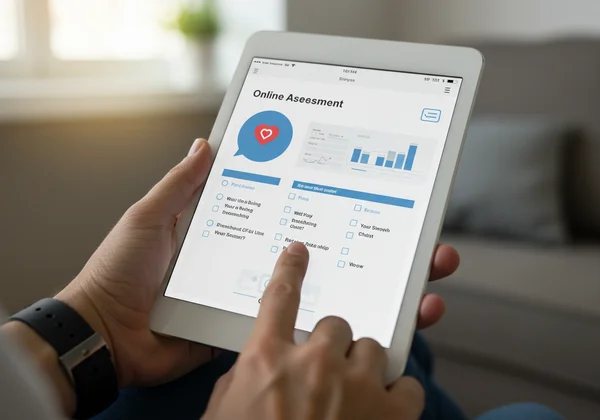Test sul Disturbo Ossessivo-Compulsivo Relazionale: ROCD o Ansia Normale?
July 21, 2025 | By Samuel Griffin
Ti senti intrappolato in un ciclo costante di dubbi sulla tua relazione? Questi pensieri intrusivi possono essere profondamente inquietanti, spingendoti a mettere in discussione incessantemente i tuoi sentimenti, il valore del tuo partner o le fondamenta stesse del vostro legame. È una situazione dolorosa e confusa. Ma come capire se si tratta di normale ansia relazionale o di qualcosa di più, come il Disturbo Ossessivo-Compulsivo Relazionale (ROCD)? Questa guida ti aiuterà a comprendere le sfumature del ROCD e a trovare chiarezza. Fare il primo passo per comprendere i tuoi sentimenti può essere potenziante, e una autovalutazione online può aiutarti a trovare un po' di chiarezza.
Cos'è il Disturbo Ossessivo-Compulsivo Relazionale (ROCD)?
Il Disturbo Ossessivo-Compulsivo Relazionale, o ROCD, è un sottotipo specifico di DOC in cui ossessioni e compulsioni sono focalizzate interamente sulle relazioni intime. A differenza delle preoccupazioni passeggere che la maggior parte delle persone sperimenta, il ROCD comporta pensieri persistenti, indesiderati e altamente angoscianti. Non si tratta di semplici dubbi; sono pensieri intrusivi che possono sembrare una tempesta incessante di "cosa succederebbe se" a cui non riesci a mettere fine.

Questa condizione può manifestarsi in due modi principali: focalizzata sulla relazione, in cui ci si ossessiona sulla "giustezza" della relazione stessa, o focalizzata sul partner, in cui ci si fissa sui difetti percepiti del partner, che siano la sua intelligenza, il suo aspetto o il suo carattere. Per molti, è un mix confuso di entrambi.
Comprendere i Sintomi del ROCD e i Pensieri Intrusivi
Al cuore del ROCD ci sono i pensieri ossessivi. Non sono semplici preoccupazioni passeggere; sono pensieri persistenti, ripetitivi e spesso contrari ai propri sentimenti genuini, il che li rende così angoscianti. Creano un ciclo di dubbi e ansia da cui sembra impossibile sfuggire.
I pensieri intrusivi comuni nel ROCD includono:
- "Amo davvero il mio partner?"
- "Il mio partner è la persona giusta per me? E se ce ne fosse una migliore?"
- "Oggi non sono attratto dal mio partner. Significa che è finita?"
- "Ho notato un difetto nella personalità del mio partner. Posso conviverci per sempre?"
- "Sto fingendo i miei sentimenti? Sto illudendo il mio partner?"
Questi pensieri possono sembrare incredibilmente reali e urgenti, richiedendo una risposta immediata che sembra non arrivare mai. Questa incertezza alimenta il lato compulsivo del ROCD.
Ossessioni e Compulsioni Comuni nel ROCD
Per far fronte all'intensa ansia causata da queste ossessioni, gli individui con ROCD mettono in atto comportamenti compulsivi. Si tratta di rituali mentali o fisici eseguiti per cercare di trovare certezza, neutralizzare il dubbio o alleviare il disagio, anche solo per un momento.
Le compulsioni comuni includono:
- Ricerca Costante di Rassicurazione: Chiedere ripetutamente ad amici, familiari o persino al proprio partner se la relazione è "giusta" o se siete una "bella" coppia.
- Verifica Mentale: Esaminare incessantemente ricordi passati per trovare prove del proprio amore o attrazione, o "testare" costantemente i propri sentimenti quando si è con il partner.
- Confronto: Confrontare ossessivamente il proprio partner o la propria relazione con altri: le relazioni degli amici, le coppie di celebrità o le rappresentazioni fittizie.
- Evitamento: Evitare situazioni che potrebbero scatenare dubbi, come film romantici, matrimoni o persino l'intimità con il partner.
- Ricerca: Passare ore online alla ricerca di risposte sui "segni del vero amore" o su come ci si sente in una relazione "perfetta".
ROCD vs Ansia Relazionale: Individuare le Differenze
Questa è la domanda centrale per molti che soffrono. Sebbene sia il ROCD che l'ansia relazionale comportino preoccupazioni riguardo alla propria partnership, la loro natura e il loro impatto differiscono fondamentalmente. Cogliere queste differenze è fondamentale. Se hai difficoltà a distinguerli, il nostro test confidenziale sul DOC può fornire uno sguardo preliminare sui tuoi sintomi.
La Natura del Dubbio: Persistente vs Transitorio
La differenza fondamentale risiede nella qualità del dubbio. Nella tipica ansia relazionale, le preoccupazioni sono spesso transitorie e legate a questioni specifiche e reali. Potresti preoccuparti dopo un litigio o durante una transizione di vita stressante. Questi sentimenti, sebbene scomodi, tendono a andare e venire.
Nel ROCD, il dubbio è persistente, circolare e totalizzante. Non ha bisogno di un innesco logico per apparire e spesso si sente scollegato dalla realtà della tua relazione. Potresti avere una giornata meravigliosa con il tuo partner e tuttavia essere assalito da pensieri ossessivi. L'obiettivo del ROCD non è risolvere un problema; è trovare una certezza impossibile.

Impatto sul Funzionamento Quotidiano e sul Benessere
Mentre l'ansia relazionale può essere stressante, il ROCD può essere debilitante. Può consumare la tua energia mentale, rendendo difficile concentrarsi sul lavoro, godersi gli hobby o essere presenti con il proprio partner. Il ciclo costante di ossessioni e compulsioni porta a un significativo disagio emotivo, senso di colpa e vergogna.
Le persone con ROCD si sentono spesso intrappolate e potrebbero persino considerare di porre fine a relazioni perfettamente sane solo per sfuggire al tormento del dubbio. La condizione attacca ciò che si ha più a cuore, trasformando una fonte di gioia in una fonte di ansia infinita. Se questi schemi ti risuonano, potrebbe essere il momento di effettuare un'autovalutazione.
Quando Considerare un Test sul ROCD e Cercare Aiuto
Se ti riconosci nelle descrizioni di cui sopra, sappi che non sei solo e ci sono passi che puoi intraprendere per capire cosa sta succedendo. Uno screening iniziale può essere uno strumento inestimabile nel tuo percorso verso il benessere.
Benefici di un'Autovalutazione Online Confidenziale
Per molti, l'idea di parlare di questi pensieri è terrificante a causa della vergogna o della paura del giudizio. È qui che un test online confidenziale e scientificamente valido sul ROCD può essere un primo passo sicuro e accessibile. Il nostro test è progettato sulla base di principi di screening psicologico consolidati, come la scala OCI, per aiutarti a identificare schemi che potrebbero essere coerenti con il DOC.

Dopo aver completato il test, hai la possibilità di ricevere un report standard o sbloccare un'analisi completa e basata sull'intelligenza artificiale. Questo report personalizzato offre approfondimenti sui tuoi sintomi, il loro potenziale impatto sulla tua vita e come potrebbero manifestarsi in scenari specifici, dandoti un quadro più chiaro per procedere.
L'Importanza della Diagnosi Professionale e del Supporto
È fondamentale ricordare che un test online è uno strumento di screening, non una diagnosi clinica. Il suo scopo è fornire informazioni e incoraggiarti a fare il passo successivo: consultare un professionista della salute mentale qualificato. Un esperto può fornire una diagnosi professionale formale e guidarti verso trattamenti efficaci.
Terapie basate sull'evidenza come l'Esposizione e Prevenzione della Risposta (ERP) e la Terapia Cognitivo-Comportamentale (CBT) sono il gold standard per il trattamento del DOC. Un terapeuta può aiutarti a imparare a gestire i pensieri intrusivi senza mettere in atto compulsioni, permettendoti di spezzare il ciclo e riconquistare la tua vita e la tua relazione dalla presa dell'ansia.
Navigare il Disturbo Ossessivo-Compulsivo Relazionale: I Tuoi Prossimi Passi
Rendersi conto della differenza tra ROCD e ansia relazionale è spesso il primo passo verso la guarigione. I tuoi dubbi non ti definiscono né il valore della tua relazione. Sono sintomi di una condizione trattabile.
Se questo articolo rispecchia la tua esperienza, considera di approfondire. Effettuare un'autovalutazione strutturata può offrire un immenso sollievo e una chiara direzione. Pronto a ottenere una comprensione più profonda dei tuoi pensieri? Fai il primo passo sulla nostra homepage oggi stesso.

Domande Frequenti sul Disturbo Ossessivo-Compulsivo Relazionale
Un test online gratuito sul ROCD può davvero indicarmi se ho il Disturbo Ossessivo-Compulsivo Relazionale?
Un test online gratuito, come quello offerto sul nostro sito, è un prezioso strumento di screening. Può aiutare a identificare se i tuoi sintomi e i tuoi schemi di pensiero sono coerenti con quelli del ROCD. Tuttavia, non può fornire una diagnosi formale. Consideralo un primo passo affidabile che ti fornisce informazioni importanti da presentare a un professionista della salute mentale per una valutazione completa. Puoi ottenere approfondimenti personalizzati per iniziare questa conversazione.
Come distinguere se le proprie preoccupazioni relazionali sono ROCD o semplice ansia normale?
La differenza principale è lo schema. L'ansia normale è spesso legata a eventi reali ed è temporanea. Il ROCD comporta pensieri ossessivi persistenti, intrusivi e indesiderati che scatenano comportamenti compulsivi (come il controllo mentale o la ricerca di rassicurazione) in un ciclo estenuante che sembra fuori dal tuo controllo e spesso scollegato dalla realtà.
Quali sono i trigger comuni del ROCD?
I trigger possono essere qualsiasi cosa che imponga un focus sulla relazione o sul suo futuro. I trigger comuni includono pietre miliari come andare a convivere, fidanzarsi o vedere post sui social media di relazioni felici degli amici. A volte, un trigger può essere semplice come il tuo partner che non risponde immediatamente "ti amo" o il notare un piccolo "difetto" percepito.
Cosa fare dopo aver effettuato un'autovalutazione sul ROCD?
Dopo aver effettuato un'autovalutazione, prenditi del tempo per rivedere i tuoi risultati. Se suggeriscono che potresti avere tratti del ROCD, il passo successivo più importante è condividere questi risultati con un medico o un terapeuta specializzato in DOC. Loro possono fornire una diagnosi accurata e creare un piano di trattamento, utilizzando spesso metodi altamente efficaci come la terapia ERP. I risultati del tuo test sono un ponte per ottenere il supporto professionale che meriti.